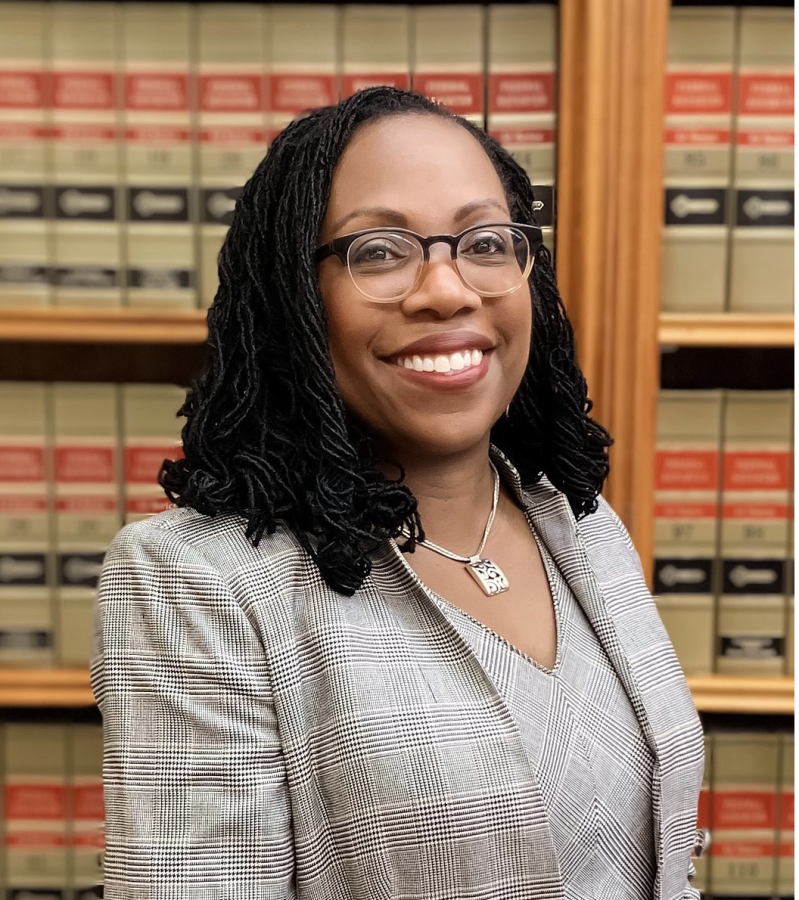In Defense of Ketanji Brown Jackson’s Supreme Court Nomination
Having a public defender on the Supreme Court would be invaluable for changing the way the Supreme Court handles cases
April 12, 2022
In the early 1960s, a poor Florida man was accused of a felony and sent to trial without counsel since, at the time, counsel was only provided for those who were charged with capital crimes. The man, who represented himself and lost the case, appealed to the Supreme Court, which agreed to hear the case. The resulting 1963 decision, Gideon v. Wainwright, solidified Americans’ right to counsel and the duty of states to provide counsel if the defendant cannot afford one in order to ensure a free and fair trial.
After this case and the 1972 Supreme Court case Argersinger v. Hamlin (which extended the right to an attorney for those charged with misdemeanor offenses), the public defender sector burgeoned. Today, public defenders play an indispensable role in protecting and upholding the rights guaranteed under these cases, the Sixth Amendment and the 14th Amendment’s Due Process Clause.
Judge Ketanji Brown Jackson could make history as the first Black woman on the Supreme Court and the first public defender in a generation if she is confirmed by the Senate at the end of the week. Jackson, who has an Ivy League education and more qualifications and experience than some current justices on the Supreme Court, faced unnecessary backlash about her role as a public defender during her confirmation hearing. However, she would bring the much-needed public defender perspective to the Supreme Court, which has been lacking it for far too long.
Holding a position as a public defender, providing counsel to those convicted of crimes, is cause for many to label someone like Jackson as “soft on crime.”
Having a public defender on the Supreme Court is rare — the last public defender to hold a position on the Supreme Court was former Justice Thurgood Marshall, over 31 years ago. In fact, it’s hard to find public defenders in judgeships at all.
According to a March 2022 analysis of data collected from 2010 to 2019 by professors at Harvard University, only about 8% of federal judges have experience as public defenders. NPR reported a similar statistic in a March 5, 2022, segment on “All Things Considered,” referencing data from the Federal Judicial Center that puts the number of public defenders-turned-federal judges at only 7%.
In that same segment, host Michel Martin interviewed Martín Sabelli, a former public defender who currently trains aspiring public defenders. Sabelli explained that there were both internal and external factors that contributed to this disparity but cites external factors as being more influential. One issue he describes is “the inertia problem,” or the pipeline from elite law school to corporate law firm to government job in the legal field, a pattern most Supreme Court picks follow and one likely to result in a less controversial Senate confirmation hearing.
The other external factor he identifies is systemic bias. “All you got to do is label somebody soft on crime,” Sabelli explained, “making our streets less safe.” And holding a position as a public defender, providing counsel to those convicted of crimes, is cause for many to label someone like Jackson as “soft on crime,” an insult Republicans like to hurl at liberals and a title that Democratic officials, like NYC Mayor Eric Adams, have taken great measures to avoid.
Jackson has not escaped any of her confirmation hearings unscathed. In her 2012 confirmation hearing for her appointment to the federal district court, Sen. Charles E. Grassley (R-IA) remarked that there was “some concern about how (she) will handle terrorism cases” due to her work as a public defender on a case regarding the rights of a prisoner at Guantánamo Bay. The same case was brought up during her 2021 confirmation hearing for her appointment to the United States Court of Appeals D.C. Circuit when Sen. Tom Cotton (R-AR) insinuated that Jackson did not care about national security risks.
Sen. Ben Sasse (R-NE) took a slightly different track to critique Jackson’s public defender background for her 2021 hearing when he demanded to know if Jackson was worried about her work resulting in “more violent criminals — including gun criminals — being put back on the streets?”
We need more public defenders on the bench because they have worked with the indigent, the disadvantaged and those otherwise precluded from a fair trial.
Most recently, Jackson again defended her public defender background during her 2022 confirmation hearing by reiterating the important role public defenders play in the U.S., particularly as protectors of individuals’ civil liberties and rights. “Defense lawyers perform a service, and our system is exemplary throughout the world precisely because we ensure that people who are accused of crimes are treated fairly,” she asserted.
In her 2021 confirmation hearing, Jackson also affirmed that her decision to work as a public defender has allowed her to better understand the inner workings of the criminal justice system not only from the perspective of the government but also from those petitioning it, something those in the legal field have pointed to as a deficit in the experience of current Supreme Court justices.
Sabelli, the former public defender, distilled the significance of Jackson’s public defender history in one sentence: “If you care about checking government power, you need to have a diversity of opinions, including people who have not spent their life allied with the government, siding with the government or not involved in these issues.”
The Sixth Amendment guarantees our right to a fair trial. If our judicial decision-makers are only trained to view cases from the side of the government, it jeopardizes everyday citizens’ chances of receiving impartial justice. We need more public defenders on the bench because they have worked with the indigent, the disadvantaged and those otherwise precluded from a fair trial.
Though the Biden administration has been trying to address this deficit, with about 30% of Biden’s federal court nominees having experience in public defending, much work remains. Even if Jackson is confirmed, the liberal justices will still be in the minority and the ideology of the Court is not expected to shift much. However, the invaluable perspective she will bring to the Court invites room for optimism. With Jackon’s confirmation, the highest court in the land is better equipped to fairly represent the people of the United States.











